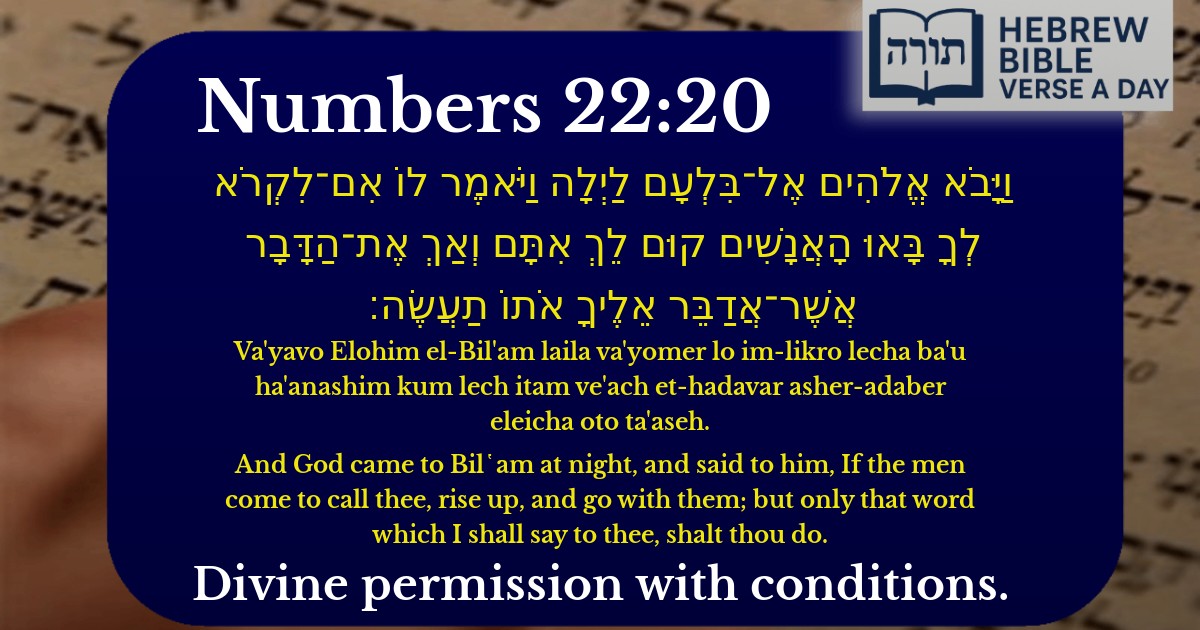Join Our Newsletter To Be Informed When New Videos Are Posted
Join the thousands of fellow Studends who rely on our videos to learn how to read the bible in Hebrew for free!
Hebrew Text
וַיָּבֹא אֱלֹהִים אֶל־בִּלְעָם לַיְלָה וַיֹּאמֶר לוֹ אִם־לִקְרֹא לְךָ בָּאוּ הָאֲנָשִׁים קוּם לֵךְ אִתָּם וְאַךְ אֶת־הַדָּבָר אֲשֶׁר־אֲדַבֵּר אֵלֶיךָ אֹתוֹ תַעֲשֶׂה׃
English Translation
And God came to Bil῾am at night, and said to him, If the men come to call thee, rise up, and go with them; but only that word which I shall say to thee, shalt thou do.
Transliteration
Va'yavo Elohim el-Bil'am laila va'yomer lo im-likro lecha ba'u ha'anashim kum lech itam ve'ach et-hadavar asher-adaber eleicha oto ta'aseh.
Hebrew Leining Text
וַיָּבֹ֨א אֱלֹהִ֥ים <small>׀</small> אֶל־בִּלְעָם֮ לַ֒יְלָה֒ וַיֹּ֣אמֶר ל֗וֹ אִם־לִקְרֹ֤א לְךָ֙ בָּ֣אוּ הָאֲנָשִׁ֔ים ק֖וּם לֵ֣ךְ אִתָּ֑ם וְאַ֗ךְ אֶת־הַדָּבָ֛ר אֲשֶׁר־אֲדַבֵּ֥ר אֵלֶ֖יךָ אֹת֥וֹ תַעֲשֶֽׂה׃
וַיָּבֹ֨א אֱלֹהִ֥ים ׀ אֶל־בִּלְעָם֮ לַ֒יְלָה֒ וַיֹּ֣אמֶר ל֗וֹ אִם־לִקְרֹ֤א לְךָ֙ בָּ֣אוּ הָאֲנָשִׁ֔ים ק֖וּם לֵ֣ךְ אִתָּ֑ם וְאַ֗ךְ אֶת־הַדָּבָ֛ר אֲשֶׁר־אֲדַבֵּ֥ר אֵלֶ֖יךָ אֹת֥וֹ תַעֲשֶֽׂה׃
🎵 Listen to leining
Parasha Commentary
📚 Talmud Citations
This verse is quoted in the Talmud.
📖 Sanhedrin 105a
The verse is discussed in the context of Balaam's prophecy and his interactions with God, highlighting the divine instruction given to Balaam regarding his actions with the men who came to call him.
📖 Nedarim 22a
The verse is referenced in a discussion about vows and divine commandments, illustrating how Balaam was instructed to follow only what God commanded him to do.


Divine Communication with Bil'am
The verse describes Hashem appearing to Bil'am at night, instructing him regarding Balak's request to curse Bnei Yisrael. Rashi (Bamidbar 22:20) notes that Hashem's appearance at night emphasizes that this was not a full prophetic experience (which typically occurs in daytime for true prophets), but rather a lower form of divine communication appropriate for Bil'am's spiritual level.
The Conditional Permission
Hashem tells Bil'am: "If the men come to call thee, rise up, and go with them". The Ramban (Bamidbar 22:20) explains this as a test for Bil'am - Hashem was giving him the opportunity to demonstrate whether he truly sought to do Hashem's will or was eager to curse Israel. The Malbim adds that the phrasing implies Bil'am should only go if summoned properly, not if he initiates the journey himself.
The Limitation on Bil'am's Speech
The concluding phrase "but only that word which I shall say to thee, shalt thou do" establishes a crucial boundary. The Sforno explains that while Bil'am was permitted to go with Balak's men, his prophetic utterances would be entirely controlled by Hashem. The Talmud (Sanhedrin 105b) derives from here that a prophet cannot say anything beyond what Hashem commands, even if given general permission to prophesy.
Midrashic Insights
Ethical Lessons
The Kli Yakar emphasizes that this episode teaches how Hashem protects Israel even through unlikely means, and how divine providence can use even wicked individuals like Bil'am to ultimately bring blessing. The Netziv adds that the nighttime appearance hints at the morally ambiguous nature of Bil'am's mission - neither fully sanctioned nor fully prohibited.